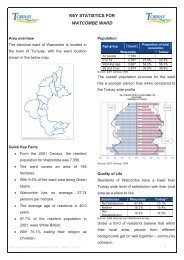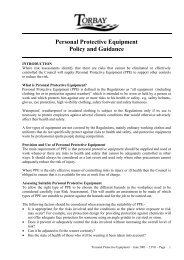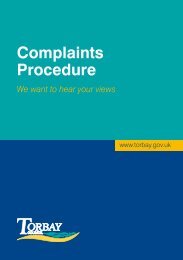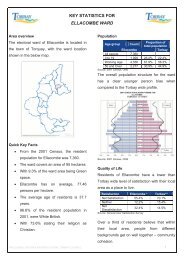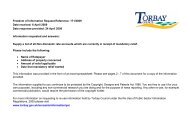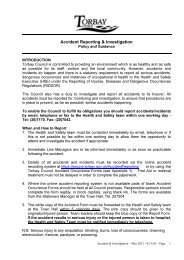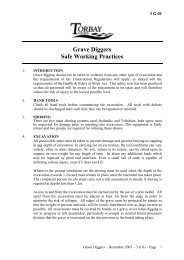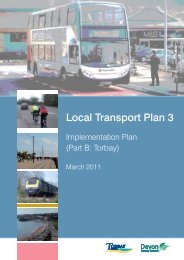PARENTING Strategy - Torbay Council
PARENTING Strategy - Torbay Council
PARENTING Strategy - Torbay Council
Create successful ePaper yourself
Turn your PDF publications into a flip-book with our unique Google optimized e-Paper software.
Parenting<strong>Strategy</strong>
<strong>Torbay</strong> <strong>Council</strong> Children’s Services : Parenting <strong>Strategy</strong>Breakdown of child and young person populationWho are they for?Universal Children and young people aged 0-19TargetedSpecialistChildren on school rollChildren eligible for free school mealsChildren subject to Special EducationalNeeds (SEN):- Action- Action PlusChildren transferring school:- primary age- secondary ageChildren and young people assistedwith school transportStatements of SENChildren and young people with sometype of mental health disorderAverage no. of children absentunauthorised from school per day:- primary age- secondary agePermanently excluded from schoolLeft school with no qualifications16-18 year olds with no education,employment or training (NEET)Young people receiving interventionsfrom Substance Misuse ServiceReferred to Youth Support annuallyYoung carersChildren in need (of social care services)Referred to Youth Offending Team (YOT)annuallyReferred to Children and AdolescentMental Health Services (CAMHS)annuallyChildren with disabilities receiving socialcare servicesGirls under 16 becoming pregnantHospital admissions due to use ofalcohol (14-18)Children looked afterChildren on child protection registerNo. of children29,70019,1293,1491,9748297332991,5008841,80061618402121743001,0008503502741781233018253The parentingprovision on offershould be groundedin evidence-basedpractice, of a highquality and withmeasurable outcomesChildren and Young People’s Plan 2006 - 2009
<strong>Torbay</strong> <strong>Council</strong> Children’s Services : Parenting <strong>Strategy</strong>Parenting AuditDuring the first half of 2007, 91 questionnaires were sent out to arange of agencies, to establish what types and quantity of parentingsupport was currently on offer. A disappointing 40 out of 91 responseswere received i.e. 36%. This naturally limits the accuracy of findings.Levels of parenting support can be ranged along a continuum, froma “light touch” approach, through more structured interventionsand ultimately to statutory involvement via Contracts or CourtOrders. Each approach has its place and can enhance parenting forsome families. What the Parenting <strong>Strategy</strong> Group has identified,however, is that the passage of families between tiers is not alwayssmooth, and once a time-limited period of parenting provisioncomes to an end some families are left without ongoing support. Ofcourse, levels of resourcing are a factor in this, but it is an issue thatneeds further consideration.Tiers of NeedNeed for Preventative SupportNeed for Remedial SupportTier 1 Low level of needRequire access to universal services and mayat all times require some additional generalparenting supportTier 2 medium level of needOften where a GP, Health Visitor, Headteacheror other professional believes a family wouldbenefit from additional support to preventtheir problems from escalating.Tier 3 high level of needIn cases where, if no intervention is made, it isprobable there will be an adverse outcome forthe child involved.Tier 4 child is already accommodatedSupport required in those cases where the aimis to potentially return the child back to livewith his/her birth parent(s).The <strong>Torbay</strong> audit identified:l 22 examples of support offered at Tier 1l 22 examples at Tier 2l 11 at Tier 3l 5 at Tier 4
<strong>Torbay</strong> <strong>Council</strong> Children’s Services : Parenting <strong>Strategy</strong>Tier 1 Low level of needBarton Primary SchoolBeehive NurseryCollaton St MaryComm Nurses PaigntonConnexions TorquayEIS Family SupportEIS Groups/OutreachEllacombe PlaygroundEllacombe SchoolHatfield NurseryHealth VisitorsHomestartKiddi Caru NurseryKings & Queens PaigntonRelateRoselands Nursery & PlaygroupSt Marychurch ToddPaignton & BrixhamChildren’s CentreTorquay Children’s Centre<strong>Torbay</strong> Family Learn<strong>Torbay</strong> Twins GroupLibrary ServicesTier 2 medium level of needCAMHSCare Trust PaigntonLINKComm Nurses PaigntonEIS Family SupportEIS Groups/OutreachEllacombe PlaygroupHatfield NurseryHealth Visitors Torquay NHomestartKings & Queens PaigntonLink Youth SupportPre-school AdvisoryRelatePaignton & BrixhamChildren’s CentreTorquay Children’s Centre<strong>Torbay</strong> Family LearnYouth Offending TeamYoung Carers<strong>Torbay</strong> Twins GroupLibrary ServicesFamily Group ConferencesTier 3 high level of needEIS Family SupportHatfield NurseryHealth VisitorsHillside Family CentreHomestartPaignton & Brixham Children’sCentreTorquay Children’s CentreYouth Offending TeamYoung CarersFamily Group ConferencesSATSTier 4 child is already accommodatedChildren’s Services PPSHealth VisitorsHillside Family CentrePaignton & Brixham Children’sCentreTorquay Children’s Centre
<strong>Torbay</strong> <strong>Council</strong> Children’s Services : Parenting <strong>Strategy</strong>Preference for Support/Advice3% 6%29% 62%one to onegroup supportananymous supportmissing/not givenThis finding needs consideration. Capacity to respond to the greaterdemand for one to one support must be maintained or increased.An evidence-based approach should also be adopted in individualwork. At present, there is a tendency to cherry pick bits of modelsor techniques that suit individual families or staff, rather than aconsistently applied approach. This makes both quality assurance andservice consistency difficult.NICE guidance for treatment of conduct disordersin children aged 12 years or younger, or with adevelopment age of 12 years or younger (July 2006).1.1 Group-based parent-training/education programmes arerecommended in the management of children with conduct disorders.1.2 Individual-based parent-training/education programmes arerecommended in the management of children with conductdisorders only in situations where there are particular difficulties inengaging with parents, or a family’s needs are too complex to bemet by group-based parent-training/education programmes.1.3 It is recommended that all parent-training/education programmes,whether group or individual-based, should:llbe structured and have a curriculum informed by principles ofsocial-learning theoryinclude relationship-enhancing strategiesl offer a sufficient number of sessions, with an optimum of 8-12, to maximise the possible benefits for participantslenable parents and carers to identify their own parentingobjectives11
<strong>Torbay</strong> <strong>Council</strong> Children’s Services : Parenting <strong>Strategy</strong>The programme is run over a 12 – 14 week period. The parents attendas a group once a week for 2 hours. There is also a telephone contactin between group sessions from the facilitators to assist with anydifficulties, questions or anxieties that parents may be experiencing inrelation to the “homework” set each week.It is designed to promote positive strategies to assist parents inmanaging children’s challenging behaviour and has also been effectivein supporting parents with children who have ADHD. By workingtogether in a group, issues such as empowering parents, collaborating,dealing with resistance, confronting and teaching are discussed.The Incredible Years Programme supports the NICE guidelinesrecommending group-based training/education programmes forparents in the management of behavioural difficulties with children.The Torquay Children’s Centre also runs “Positive Parenting Courses”based on the Family Caring Trust model. The model draws on Adlerianpsychology, Family Systems model, Reality Therapy, Re-evaluationCounselling and Person Centred Counselling. The course has beenextensively evaluated by external statutory and voluntary agencies. Courseparticipants report a range of positive changes as a result of attendanceat the group, including improved listening and communication skills anddealing with unwanted behaviours more appropriately.Parents as Partners in EarlyLearning Project (PPEL)In early 2007, <strong>Torbay</strong>’s Early Years and Childcare Service, ExtendedSchools and Childcare Group made a successful bid to pilot anapproach that aims to involve parents in their children’s learning inways that are meaningful to them. Every child and parent in EarlyYears settings will have the same opportunities across <strong>Torbay</strong>. Theproject will use Learning Together Packs, Learning Diaries and theuse of IT, to engage more parents, particularly dads, in their child’slearning. Staff will work with individuals or groups of parents, makinga particular effort to contact the “hard to reach” families, who may feeluncomfortable about attending a group.This pilot recognises the importance of the parent’s knowledge of thechild and the learning that can go on at home. It is envisaged thatevery child within <strong>Torbay</strong> will have a learning diary within 5 years, whichcontains contributions from parents and other agencies.Social and EmotionalAspects of Learning (SEAL)<strong>Torbay</strong> has embraced the Primary National <strong>Strategy</strong> Excellence andEnjoyment: Social and Emotional Aspects of Learning materialscontained within the DfES packs and all 32 primary schools have13
<strong>Torbay</strong> <strong>Council</strong> Children’s Services : Parenting <strong>Strategy</strong>adopted the principles. The premise is that unless children areemotionally healthy, their ability to learn will be impaired. The DfESstates that it is aiming for children who: “… learn how to communicatetheir feelings, set themselves goals and work towards them, interactsuccessfully with others, resolve conflicts peaceably, control their angerand negotiate their way through the many complex relationships intheir lives today and tomorrow.”Developing children’s social, emotional and behavioural skills is bestachieved through a whole-school approach in which all school staffmodel these skills. Adopting the themed approach set out in theresource pack helps schools to develop consistency and continuity,as the children build on their skills within the five key areas of selfawareness,managing feelings, empathy, motivation and social skills.Some schools have also been supported to develop SEAL group workfor identified children who need additional support. National feedbackhas found that classrooms and playgrounds were calmer; children’sempathy, confidence, social communication, negotiating skills, attitudesand work were perceived to have improved. Schools are beginning toinvolve parents/carers in SEAL by using SEAL Family Activities and byoffering SEAL Family Workshops in which parents learn how to supportthe development of their child’s social, emotional and behavioural skills.During 2007/2008, SEAL will also begin to be rolled out across thesecondary school community.Contribution of VolunteersThe Parents Consultation revealed how much parents value the role ofvoluntary support. “Homestart” is commissioned by our local Children’sCentres to support families with children under the age of 5 in apractical or “befriending” capacity. Children’s Services is also developinga Volunteering <strong>Strategy</strong> to support parents with older children or thosein crisis. Over the next year we are committed to evaluating capacityrequirements, value for money and quality of voluntary provision. Arecruitment campaign aims to attract a wider skill mix within potentialvolunteers so that more families can draw on the sorts of support theyhave told us they value.School-based volunteers have been trained to adopt SEAL principleswithin their work with individual children.14Extended Services <strong>Strategy</strong>The development of extended services in and around schools is afundamental component of <strong>Torbay</strong>’s preventative strategy to improvethe provision of early intervention for children, young people and theirfamilies at times of need. By September 2010, every school shouldbe working closely with other partners to deliver a “full core offer”comprising: Swift and Easy Referral, Childcare/Activities, Study Support,Parenting Support and Community Access.
<strong>Torbay</strong> <strong>Council</strong> Children’s Services : Parenting <strong>Strategy</strong>The Parenting Support element should: increase parental interestand involvement in learning through the development of targetedparenting programmes and family learning opportunities; and provideinformation on the availability of local and national services.One of the ways in which schools can offer parenting supportand therefore meet this element of the Core Offer is via TransitionInformation Sessions for parents.Transition InformationSessions<strong>Torbay</strong> has been allocated eight places during Autumn 2007 forpractitioners to undertake training that will enable staff to roll outprogrammes of support to parents as their children enter primary orsecondary phase education. These transition phases are extremelyimportant to the adjustment of children within a school setting and asuccessful transition can lead to higher academic attainment as wellas children feeling more settled and confident. The 8 places have beenallocated and a multi-disciplinary approach has been adopted. We aimto consider how to maximize delivery of these sessions so that a widespread of schools and parents may benefit. Delivery will commence inSeptember 2008.Reducing TeenageConceptionTeenage pregnancy is a serious social problem. Having children at ayoung age can damage young women’s health and well-being andseverely limit their education and career prospects. While individualyoung people can be competent parents, all the evidence shows thatchildren born to teenagers are much more likely to experience a rangeof negative outcomes in later life.<strong>Torbay</strong> has been set a target to reduce teenage conceptions by 50%from 44.2 conceptions per 1000 population in 1998 to 22.1 per 1000population in 2010. In terms of the actual number of conceptions, thisequates to having no more than 54 under 18 conceptions by 2010. Thenumber of conceptions in 2005 was 118, which equates to a rate of48.6 per 1000.Parents have a crucial role in helping to address teenage conceptionsby talking to their children about sex and relationships and raisingtheir children’s aspirations. All evidence shows that if childrenhave been informed about sex and relationships from an early age,especially if this is by their parents, they are more likely to delaysexual activity and feel more confident in talking about and usingcontraception with their sexual partners.Case StudySam is a single parentto 5 year old Holly.Holly had seen her mumbeing beaten up by herboyfriend and alsobeen in bed in the samebedroom when Samand her boyfriend hadbeen having sex. Holly’sswearing and aggressivebehaviour in school wascausing a problem andshe had few friends. Samhad mild depression. ACommon Assessmentresulted in ParentingSupport being offered.Sam was encouragedto seek medicationand counselling forher depression; andshe worked withher Family SupportWorker on improvingassertiveness, shieldingHolly from witnessingadult sexual behaviourand protecting herselfand Holly from violence.Holly went to a groupfor children who hadsuffered domesticviolence and Sam washelped to move into amore suitable flat.15
<strong>Torbay</strong> <strong>Council</strong> Children’s Services : Parenting <strong>Strategy</strong>Case StudyShelley and Pete hadhad involvement withthe police and socialworkers last year forbeating their two youngboys with a stick. Ayear on and Shelley wasfinding it hard to copeand had resorted toviolence and restraintagain. The Family SupportWorker found out thatShelley had lost bothher parents during thelast year and was stillgrieving for them. She feltunable to demonstrateany emotion towardsher sons, who werealso grieving for theirgrandparents. Work wasdone with Shelley andthe boys to help themwork through their grief.Eventually, Shelley feltable to cuddle her boys– which she hadn’t donefor many weeks.16Ofsted state: “Young people report that many parents and teachersare not very good at talking to them about sensitive issues, such assexuality. Teachers, governors and parents have not received sufficientguidance and support to deal successfully with these aspects.”This is confirmed within a local survey conducted in 2007, when only41.7% of the young people who responded felt that they could talk totheir parents about sex and relationships. As a result, we have identifieda training model called “Speakeasy” which enhances parents’ abilitiesto talk to their children about sensitive issues and will be training agroup of staff during Autumn 07, in order to start rolling out thiscourse in the Spring term 2008.Respect AgendaIn September 2005, the Government established the Respect TaskForce, a cross-Governmental organisation that works closely with localareas to tackle bad behaviour and nurture good - and so help createa modern culture of respect. Respect is about central government,local agencies, local communities and ultimately every citizen workingtogether to build a society in which we can respect one another- where anti-social behaviour is rare and tackled effectively, andcommunities can live in peace together.The Respect Task Force nationally and Safer Communities <strong>Torbay</strong>recognise that parents have a critical role in helping their childrendevelop good values and behaviour. Conversely, poor parentingincreases the risks of involvement in anti-social behaviour. Thereforein partnership with the Respect Task Force, Safer Communities <strong>Torbay</strong>wants to develop parenting services and focus on those parents whoneed it most. Through a support grant from the Respect Task Force,Safer Communities <strong>Torbay</strong> have been able to employ a temporaryParenting Worker who will work with parents to strengthen theirparenting skills and help them take preventative action to reduce antisocialbehaviour and ultimately strengthen communities.Problematic Drugand Alcohol Use“Parental problem drug use can and does cause serious harm at everystage from conception to adulthood” Hidden Harm by the Advisory<strong>Council</strong> for the Misuse of Drugs (ACMD) 2003. Within <strong>Torbay</strong> the 48key recommendations of Hidden Harm are taken seriously with theappointment of a lead for the Hidden Harm agenda. In 2005 and 2006<strong>Torbay</strong> Drug Action Team co-organised Devon-wide Conferences aimedat raising awareness, developing cross area protocols and improvingevidence based practice. These conferences were acknowledged asgood practice in “Hidden Harm - Three Years On”. Awareness traininghas been in place since 2002 and is part of core safeguarding training.Identifying the presence of parental substance use is a key priority area
<strong>Torbay</strong> <strong>Council</strong> Children’s Services : Parenting <strong>Strategy</strong>What? How? When? Who? Outcome MeasureRaise awarenessof local parentingsupport via a range ofmediaEstablish an accessibleand user-friendlyparenting website.Develop a parentingbooklet that can behanded out to parentsand staff.April 08December 2008Data Officer/AllAll/ CommunicationsTeamIncreased take-up ofparenting servicesEvaluate and build onlessons learnt fromthe intensive HealthVisiting serviceIncrease the numberof dads accessingparenting servicesEstablish a “parentingcare pathway” so thatparents can movewith ease throughlevels of supportappropriate to needAttend cluster eventse.g. pupil mentoringdays and promoteparentingRaise prominenceof the range ofparenting provisionvia Cluster promotionReport on outcomesof this enhancedservice; exploreopportunities toembed any positiveoutcomesUndertake marketresearch to establishbarriers to accessExamine any examplesof good practiceand produce amodel appropriateto <strong>Torbay</strong>’scircumstancesApril 2008September 2007August 2008Early InterventionCluster staff/CommunicationsteamHealth Visiting/SchoolNursing ManagerClear measurementcriteria establishedlinked to CYPPprioritiesSeptember 2008 All Repeat Consultationduring 2008demonstrates a higherproportion of dadsthan during 2007October 2008 All Professionals areaware of and use themodel as a means to“hand over” parentsto appropriateprovision rather thanclose the case19
This document can be made available in other languages, on tape,in Braille, large print and in other formats. For further informationplease contact 01803 20####





